Learning Arabic in Morocco is an excellent way to gain a deep understanding of the Arabic language and culture. Whether you are a beginner or an advanced speaker, Morocco offers a range of programs and opportunities to help you achieve your language goals. With its rich history, diverse population, and beautiful landscapes, Morocco is an ideal place to immerse yourself in the Arabic language and culture.
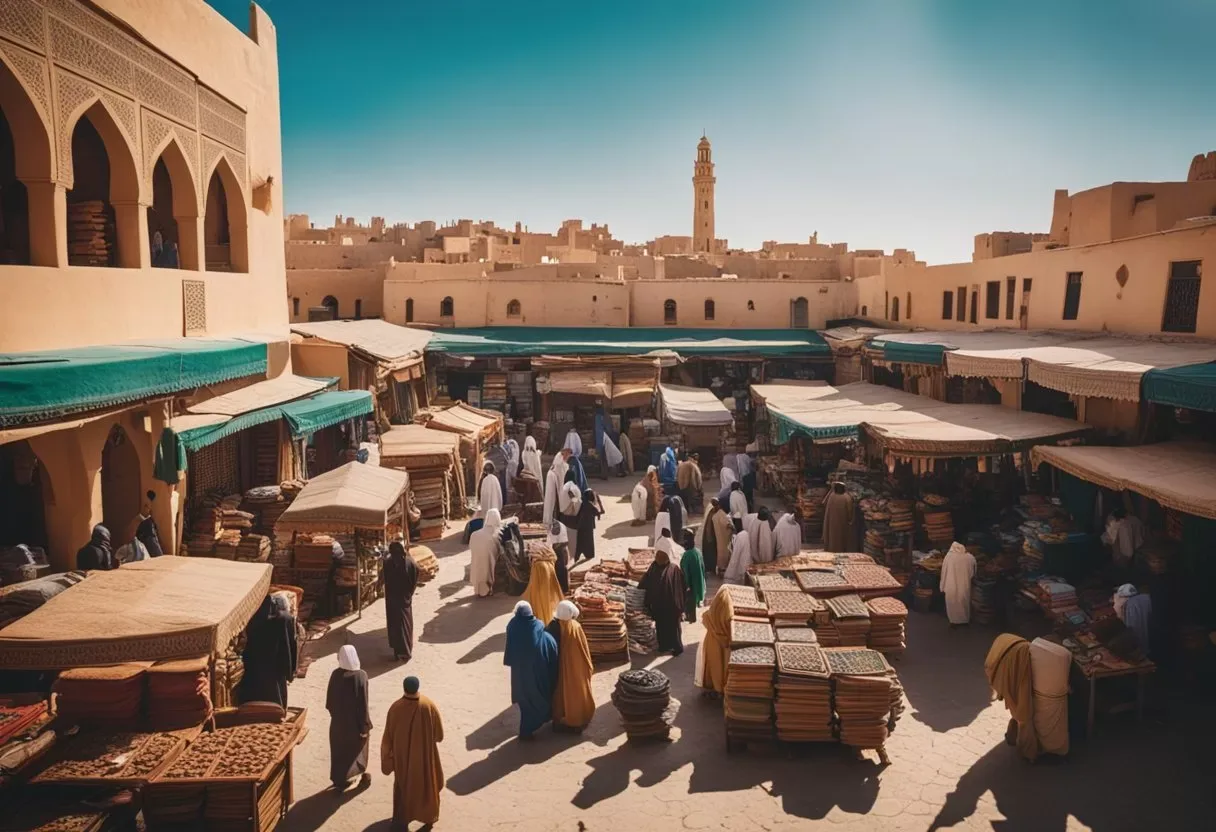
Why Learning Arabic in Morocco? Morocco is a country that is steeped in history and culture, making it an ideal location for learning Arabic. Not only is Arabic the official language of Morocco but it is also spoken widely throughout the region. Arabic is the fifth most spoken language in the world, and it is the language of the Quran, making it a critical language for anyone interested in Islamic culture and religion. Additionally, learning Arabic in Morocco can help you gain a competitive edge in the job market, especially if you are interested in working in the Middle East or North Africa.
Choosing the Right Program If you are interested in learning Arabic in Morocco, there are many programs to choose from, including language schools, homestays, and cultural immersion programs. When choosing a program, it is essential to consider your language goals, budget, and preferred learning style. Some programs offer intensive language instruction, while others focus more on cultural immersion and language practice. Additionally, it is crucial to consider the location of the program, as some cities are more conducive to language learning than others.
Key Takeaways
- Learning Arabic in Morocco is an excellent way to gain a deep understanding of the Arabic language and culture.
- Morocco offers a range of programs and opportunities to help you achieve your language goals.
- When choosing a program, it is essential to consider your language goals, budget, and preferred learning style.
Why Learning Arabic in Morocco?
Morocco is one of the top destinations for learning Arabic. The country is known for its rich culture, welcoming locals, and diverse landscapes. Learning Arabic in Morocco is an excellent opportunity to immerse oneself in the language, culture, and history of the country.
Benefits of Learning Arabic
Learning Arabic in Morocco has many benefits. Firstly, Arabic is the fifth most spoken language in the world, with over 300 million speakers. It is also one of the six official languages of the United Nations. Learning Arabic can open up many opportunities for communication and business in the Middle East and North Africa.
Secondly, learning Arabic in Morocco is an excellent way to improve one’s language skills. The Moroccan dialect of Arabic is unique, and it is spoken differently from other Arabic-speaking countries. Learning the Moroccan dialect can help one understand other dialects of Arabic, as well as improving one’s overall Arabic language skills.
Thirdly, learning Arabic in Morocco is an excellent way to gain a deeper understanding of the country’s culture and history. Arabic is an integral part of Moroccan culture, and learning the language can help one understand the country’s customs, traditions, and way of life.
Moroccan Culture and Language
Moroccan culture is a unique blend of Arab, Berber, and European influences. The country is known for its vibrant music, delicious cuisine, and beautiful architecture. Learning Arabic in Morocco can help one appreciate and understand the country’s rich culture and history.
Moroccan Arabic, also known as Darija, is the dialect of Arabic spoken in Morocco. It is a unique dialect that incorporates many Berber and French words. Learning Darija can be challenging, but it is a rewarding experience that can help one communicate with locals and gain a deeper understanding of Moroccan culture.
In conclusion, learning Arabic in Morocco is an excellent opportunity to immerse oneself in the language, culture, and history of the country. It can open up many opportunities for communication and business in the Middle East and North Africa, improve one’s language skills, and help one appreciate and understand Moroccan culture.
Related Posts:
- Best Time to Visit Morocco 2024
- How Safe is Morocco for Tourists?
- From Fes to Marrakech Visiting Morocco During Ramadan 2024: Best Tips and Guidelines
- Why You Should Visit the Sahara Desert in Morocco
Choosing the Right Program
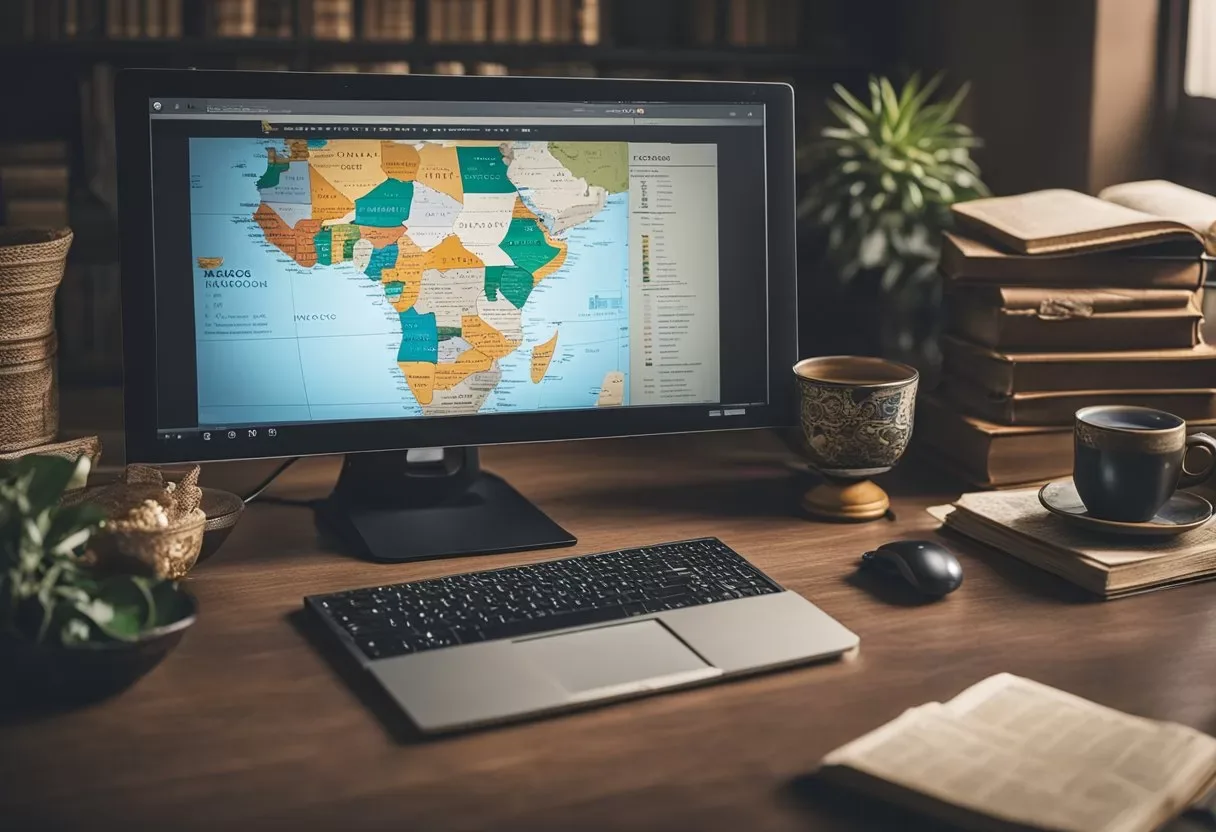
Learning Arabic in Morocco is an exciting and rewarding experience that can help you gain a deeper understanding of the language and culture. However, choosing the right program can be overwhelming, especially if you’re new to the language. Here are some factors to consider when choosing a program:
Types of Arabic Language Programs
There are different types of Arabic language programs available in Morocco, including short-term language courses and intensive programs that offer a more in-depth learning experience. Short-term courses are ideal for those who want to learn the basics of the language quickly. On the other hand, intensive programs are more suitable for those who want to become fluent in Arabic.
Moroccan Arabic Courses vs. Standard Arabic
Moroccan Arabic is the dialect of Arabic spoken in Morocco, and it has some differences from Standard Arabic. If you plan to use your language skills in Morocco, then it’s recommended to learn Moroccan Arabic. However, if you plan to use your language skills in other Arabic-speaking countries, then Standard Arabic might be more suitable.
Intensive Arabic Course Morocco
Intensive Arabic courses in Morocco are designed for students who want to become fluent in Arabic quickly. These courses are usually full-time and last for several weeks or months. They provide a comprehensive learning experience that includes classroom instruction, cultural immersion activities, and opportunities to practice speaking with native speakers.
Online Arabic Courses Morocco
Online Arabic courses are a convenient option for those who cannot attend in-person classes. Many reputable language schools in Morocco offer online courses that provide the same high-quality instruction as their in-person courses. Online courses are ideal for those who have busy schedules or live in remote areas.
Morocco Study Abroad
Studying abroad in Morocco is an excellent way to immerse yourself in the language and culture. Many universities and language schools in Morocco offer study abroad programs that provide students with the opportunity to live with host families, attend classes, and participate in cultural activities. Studying abroad in Morocco is a great way to gain a deeper understanding of the language and culture while making new friends and experiencing a new way of life.
In conclusion, choosing the right program is crucial to your success in learning Arabic in Morocco. Consider your goals, budget, and learning style when selecting a program. Whether you choose a short-term language course, an intensive program, or a study abroad program, you’ll be on your way to becoming fluent in Arabic in no time.
Relevant Facts:
- Morocco is a multilingual country where Arabic is the official language.
- The Moroccan dialect of Arabic is unique and has some differences from Standard Arabic.
- Morocco is a popular destination for language learners due to its rich culture and history.
- Many language schools in Morocco offer high-quality language instruction and cultural immersion activities.
- Studying abroad in Morocco is a great way to gain a deeper understanding of the language and culture while making new friends and experiencing a new way of life.
Table:
| Program Type | Description |
|---|---|
| Short-term Language Courses | Ideal for those who want to learn the basics of the language quickly |
| Intensive Programs | Suitable for those who want to become fluent in Arabic |
| Online Courses | Convenient option for those who cannot attend in-person classes |
| Study Abroad Programs | Great way to immerse yourself in the language and culture |
Quote:
“Learning a new language is like becoming a new person.” – Haruki Murakami
URLs to Link To:
- Learning Arabic in Morocco: The Ultimate Guide to Mastering the Language
- A Guide to Learning Arabic in Morocco – MarocMama
- 7 Things to Know Before You Study Arabic in Morocco – GoAbroad.com
- Learning Arabic In Morocco: A Comprehensive Guide To Mastering The Language
- Learning Arabic in Morocco | Journey Beyond Travel
Understanding Moroccan Arabic (Darija)
Moroccan Arabic, also known as Darija, is the spoken language of Morocco. It is a dialect of Arabic that has been heavily influenced by Berber, French, and Spanish. Darija is a unique dialect that is not widely spoken outside of Morocco, making it a valuable language to learn for those interested in the country’s culture and history.
Darija Classes Morocco
There are several options for Darija classes in Morocco, ranging from private tutors to group classes. Language schools such as the Arabic Language Institute in Fez and the Qalam wa Lawh Center in Rabat offer intensive Darija courses for students of all levels. Private tutors can also be found through online platforms such as Italki and Preply.
Moroccan Dialect Lessons
Moroccan dialect lessons are a great way to learn Darija in a more informal setting. These lessons are often taught by locals and can provide a more authentic learning experience. Many language schools and cultural centers in Morocco offer Moroccan dialect lessons, and they can also be found through online platforms such as Meetup.
Dialect Training in Morocco
Dialect training in Morocco is a unique opportunity to learn Darija while immersing oneself in the country’s culture. Many language schools and cultural centers offer immersive programs that combine language classes with cultural activities such as cooking classes and guided tours. These programs provide an excellent opportunity to practice speaking Darija in real-life situations.
According to the Arabic Language Institute in Fez, “Learning Arabic in Morocco is an excellent way to immerse oneself in the language and culture of the country. Darija is a unique dialect that is not widely spoken outside of Morocco, making it a valuable language to learn for those interested in the country’s culture and history.”
In conclusion, there are many opportunities to learn Darija in Morocco, from language schools to dialect lessons to immersive programs. With dedication and practice, students can become fluent in this unique and valuable dialect.
Arabic Language Schools in Morocco
Morocco is a great destination for learning Arabic, with a wide range of language schools available to suit different needs and budgets. Here are some things to consider when choosing the right school for learning Arabic in Morocco.
Choosing the Right School
When choosing an Arabic language school in Morocco, it is important to consider factors such as the quality of the teaching, the location of the school, the size of the classes, and the cost of the courses. Some of the most popular Arabic language schools in Morocco include Dar Loughat, Qalam wa Lawh, and the Arab American Language Institute in Morocco (AALIM). These schools offer a range of courses for different levels of proficiency, from beginner to advanced.
Certification and Accreditation
It is important to choose a language school that is accredited and recognized by relevant language certification bodies. This ensures that the courses you take are of a high quality and that the certification you receive is recognized by employers and educational institutions. Some of the most recognized language certification bodies in Morocco include the Moroccan Ministry of National Education and the Cervantes Institute.
Language Learning Environment
The language learning environment is also an important factor to consider when choosing a language school in Morocco. Some schools offer a more immersive experience, with opportunities to practice Arabic outside of the classroom through cultural activities and homestays with local families. Other schools may offer a more structured classroom-based approach. It is important to choose a school that matches your learning style and preferences.
According to LanguageCourse.net, some of the top Arabic language schools in Morocco include:
| School | Location | Course Offerings |
|---|---|---|
| Dar Loughat | Tetouan | Standard Arabic, Moroccan Arabic, Colloquial Arabic |
| Qalam wa Lawh | Rabat | Standard Arabic, Moroccan Arabic, Colloquial Arabic, Islamic Studies |
| AALIM | Rabat | Standard Arabic, Moroccan Arabic, Colloquial Arabic, Culture and Civilization |
In conclusion, Morocco offers a great opportunity to learn Arabic in an immersive and culturally rich environment. By choosing the right language school, considering certification and accreditation, and selecting a learning environment that matches your preferences, you can maximize your chances of success in learning Arabic in Morocco.
Cultural Immersion and Language Practice
Learning Arabic in Morocco is not just about sitting in a classroom and memorizing vocabulary words. It’s also about immersing oneself in the culture and practicing the language in real-life situations. In this section, we will discuss some of the best ways to experience Moroccan culture and practice Arabic.
Cultural Immersion Programs
One of the best ways to immerse oneself in Moroccan culture is to participate in a cultural immersion program. These programs typically include language classes, cultural activities, and homestays with Moroccan families. They offer a unique opportunity to experience Moroccan culture firsthand, while also improving one’s Arabic skills.
Some popular cultural immersion programs in Morocco include the Arabic Language Institute in Fez, the Qalam wa Lawh Center in Rabat, and the Center for Cross-Cultural Learning in Marrakech. These programs offer a range of courses, from beginner to advanced, and can be customized to meet the needs of individual learners.
Language Exchange in Morocco
Another great way to practice Arabic in Morocco is to participate in a language exchange program. These programs allow learners to practice their Arabic with native speakers, while also learning about Moroccan culture. Language exchange programs can be arranged through language schools, cultural centers, or online language exchange platforms.
One popular language exchange platform is iTalki, which connects learners with native Arabic speakers for one-on-one language practice. Another option is Tandem, which allows learners to connect with language partners via a mobile app.
Living with a Moroccan Family
Living with a Moroccan family is perhaps the most immersive way to experience Moroccan culture and practice Arabic. Homestays allow learners to live with a local family, eat traditional Moroccan food, and participate in daily activities. This can be a great way to improve one’s Arabic skills, while also gaining a deeper understanding of Moroccan culture.
Homestays can be arranged through language schools, cultural centers, or homestay agencies. Some popular homestay agencies in Morocco include Homestay.com and Moroccan Homestay.
Overall, cultural immersion and language practice are essential components of learning Arabic in Morocco. By immersing themselves in Moroccan culture and practicing Arabic in real-life situations, learners can gain a deeper understanding of the language and culture, and make significant progress in their language-learning journey.
Related Posts:
- How Do Moroccans Eat Couscous: Unveiling the Cultural Delight
- Best Places to Eat in Marrakech Medina: A Guide to the Top Restaurants and Cafes
- The Ultimate Guide to Shopping for Souvenirs in the Marrakech Souks (Without Getting Lost)
- Almond Blossom Festival Morocco 2024: Dates, Events, and Everything You Need to Know
- Top Rooftop Cafes in Essaouira for Breathtaking Views and a Relaxed Atmosphere
Developing Arabic Speaking Skills
Learning Arabic in Morocco is an exciting journey that opens up many opportunities to explore the rich culture and history of the country. Developing Arabic speaking skills is an essential aspect of the learning process. Arabic speaking skills can be honed through everyday conversations, professional and academic use, and by overcoming language challenges.
Everyday Conversations
The Moroccan local dialects are an essential part of the everyday conversations that take place in Morocco. The most widely spoken dialect is Darija, which is a mixture of Arabic, Berber, and French. Learning the basic Darija phrases and expressions is an excellent way to develop Arabic speaking skills. Some of the commonly used phrases include “Salam Alaikum” (peace be upon you), “Shukran” (thank you), and “La Bas?” (how are you?).
Professional and Academic Use
Arabic is the official language of Morocco, and it is used in all official documents and formal settings. Developing Arabic speaking skills is crucial for professional and academic use. Learning the formal Arabic language, which is also known as Modern Standard Arabic (MSA), is essential for academic and professional settings. MSA is used in formal speeches, news broadcasts, and written documents.
Language Challenges and Tips
Learning a new language can be challenging, but with the right approach, it can be an enjoyable experience. One of the most significant challenges of learning Arabic in Morocco is the different dialects used in different regions of the country. However, with regular practice and exposure to different dialects, learners can develop a better understanding of the language.
To improve Arabic speaking skills, learners should practice speaking with native speakers, watch Arabic movies and TV shows, and listen to Arabic music. It is also essential to learn the Arabic alphabet, which has 28 letters, and understand the pronunciation of each letter.
In conclusion, developing Arabic speaking skills is an essential aspect of learning Arabic in Morocco. Everyday conversations, professional and academic use, and overcoming language challenges are some of the ways to hone Arabic speaking skills. With regular practice and exposure to different dialects, learners can become fluent in Arabic and experience the rich culture and history of Morocco.
Relevant Facts and Quotes
- According to Morocco World News, Morocco will offer Arabic classes to foreigners in 2022.
- “Language is the road map of a culture. It tells you where its people come from and where they are going.” – Rita Mae Brown
Table
| Arabic Speaking Skills | Tips |
|---|---|
| Everyday Conversations | Learn basic Darija phrases and expressions |
| Professional and Academic Use | Learn Modern Standard Arabic (MSA) |
| Language Challenges and Tips | Practice speaking with native speakers, watch Arabic movies and TV shows, listen to Arabic music, learn the Arabic alphabet |
URLs to Link To
Resources and Tools for Learning Arabic
When it comes to learning Arabic in Morocco, there are various resources and tools available to help you achieve your goals. Whether you are a beginner or an advanced learner, there are resources available that cater to your needs. Here are some of the top resources and tools to consider:
Books and Educational Materials
Books and educational materials are a great way to learning Arabic in Morocco. There are many books available that cater to learners of all levels. Some of the most popular books include “Arabic for Dummies,” “The Arabic Alphabet,” and “Arabic Grammar in Context.” These books are widely available in bookstores and online, and they are a great way to supplement your learning.
Another great resource for educational materials is Study Arabic Morocco. This program offers a range of courses and materials to help you learning Arabic in Morocco. The program is designed for learners of all levels, and it offers a range of resources, including textbooks, workbooks, and audio materials.
Online Resources and Communities
Online resources and communities are another great way to learning Arabic in Morocco. There are many websites and online communities that cater to learners of all levels. Some of the most popular websites include Fluent in 3 Months and Lexody. These websites offer a range of resources, including grammar lessons, vocabulary lists, and conversation practice.
Another great online community to consider is Moroccan Arabic Learning Programs. This program offers a range of courses and resources to help you learn Moroccan Arabic. The program is designed for learners of all levels, and it offers a range of resources, including online courses, video lessons, and audio materials.
In addition to these resources, it’s important to immerse yourself in the language as much as possible. This can include watching Arabic movies, listening to Arabic music, and speaking with native speakers. By using a combination of these resources and tools, you can quickly and effectively learning Arabic in Morocco.
According to Fluent in 3 Months, “The best way to learn Arabic is to surround yourself with the language as much as possible.” This means using a variety of resources and tools, including books, educational materials, online resources, and communities. By using these resources, you can quickly and effectively be learning Arabic in Morocco.
In addition, Moroccan Arabic Learning Programs states that “Our program is designed to help you learn Moroccan Arabic quickly and effectively.” This program offers a range of courses and resources to help you learn Moroccan Arabic, including online courses, video lessons, and audio materials.
Overall, there are many resources and tools available to help you learning Arabic in Morocco. By using a combination of these resources and tools, you can quickly and effectively learn the language and achieve your goals.
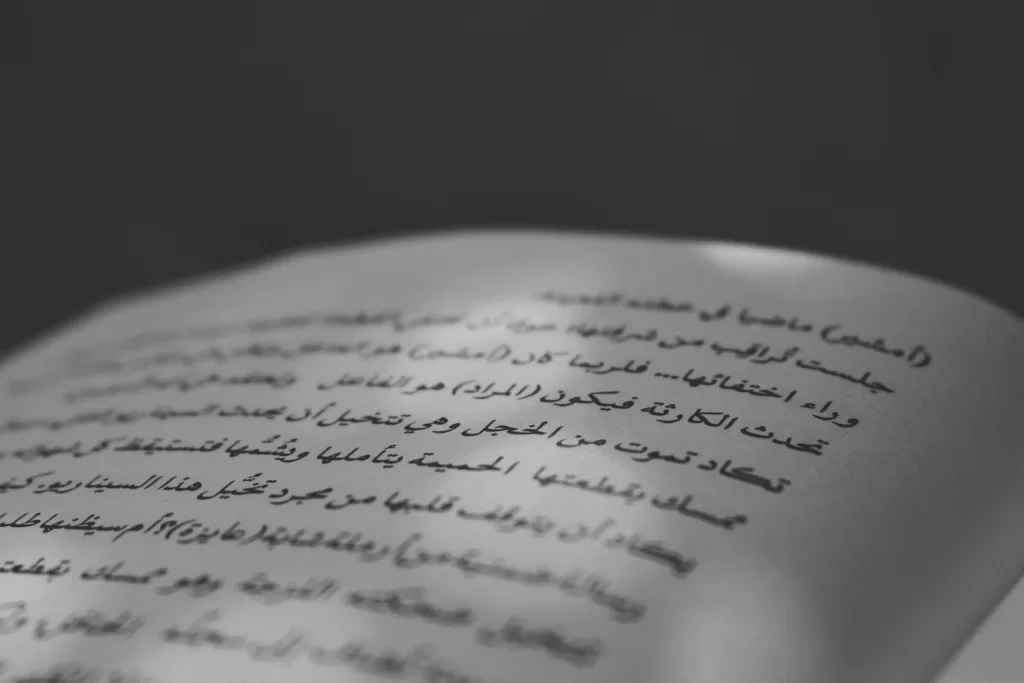
Here’s a list of the 30 commonly used Arabic words, their transliterations, and English meanings:
| Arabic Word (Arabic Script) | Arabic Word (Latin Script) | English Meaning |
|---|---|---|
| السلام عليكم | As-salamu alaykum | Peace be upon you |
| شكراً | Shukran | Thank you |
| نعم | Na’am | Yes |
| لا | La | No |
| من فضلك | Min fadlik | Please |
| مرحباً | Marhaban | Hello |
| مع السلامة | Ma’a as-salamah | Goodbye |
| كيف حالك؟ | Kayfa halak? | How are you? |
| آسف | Asif | Sorry |
| لا أعرف | La aarif | I don’t know |
| إسم | Ism | Name |
| كبير | Kabir | Big/Large |
| صغير | Saghīr | Small |
| جميل | Jamil | Beautiful |
| سيارة | Sayara | Car |
| كتاب | Kitab | Book |
| ماء | Maa | Water |
| طعام | Ta’am | Food |
| مدينة | Madina | City |
| بيت | Bayt | House |
| عمل | Amal | Work |
| يوم | Yawm | Day |
| ليل | Layl | Night |
| صديق | Sadiq | Friend |
| عائلة | Aa’ila | Family |
| مدرسة | Madrasa | School |
| جامعة | Jami’a | University |
| مستشفى | Mustashfa | Hospital |
| سوق | Souq | Market |
| طريق | Tariq | Road/Path |
| بلد | Balad | Country |
This list includes a variety of words that are fundamental in everyday Arabic conversation. It encompasses nouns, adjectives, and phrases used in daily interactions. The pronunciation and usage can vary depending on the dialect and region.
Measuring Your Progress
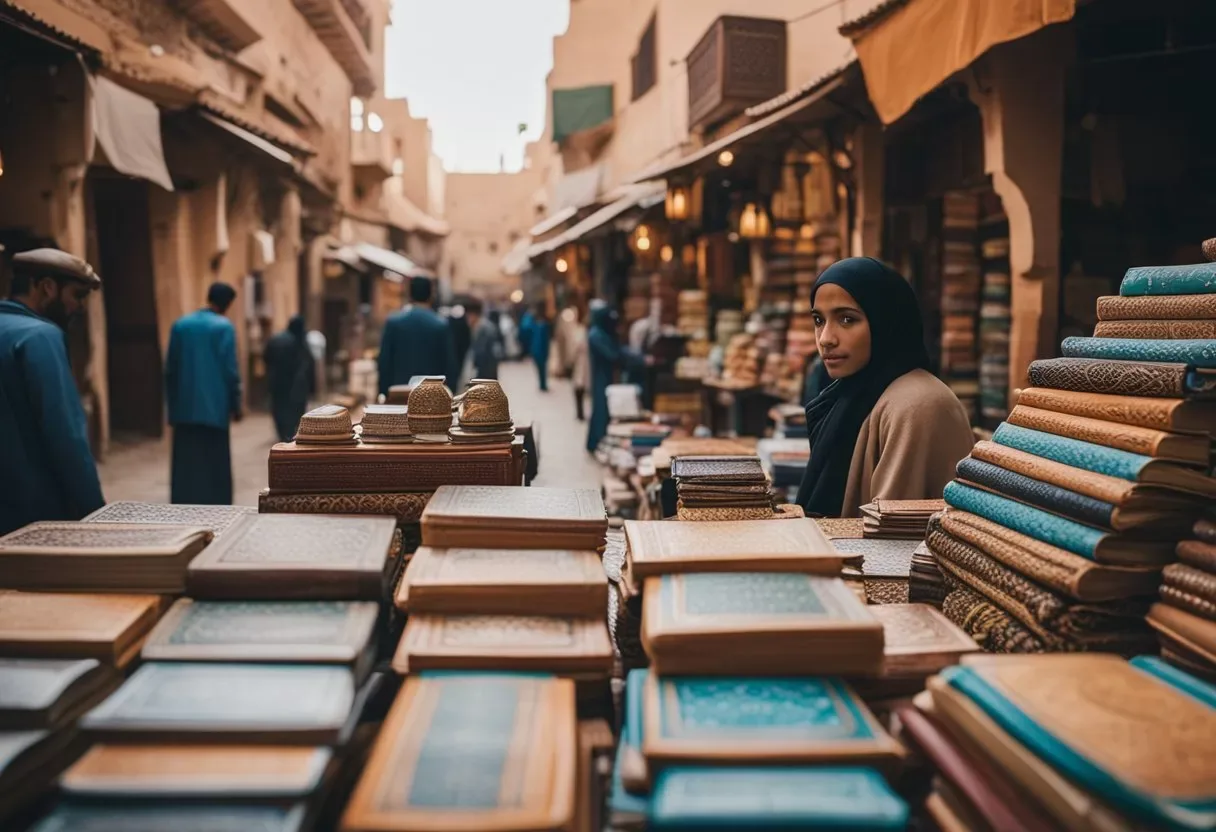
Learning a new language can be a challenging task, but it can also be an incredibly rewarding experience. Measuring your progress is an essential part of the language-learning process. It helps you stay motivated and focused on your goals. In this section, we will discuss some ways to measure your progress while learning Arabic in Morocco.
Setting Realistic Goals
Setting realistic goals is an important step toward measuring your progress. It’s essential to set achievable goals that are specific, measurable, and realistic. For example, if you’re a beginner, your goal might be to learn ten new words every day. As you progress, you can set more challenging goals, such as reading a newspaper article in Arabic or having a conversation with a native speaker.
Arabic Language Proficiency Tests
Taking an Arabic language proficiency test is an excellent way to measure your progress. These tests are designed to evaluate your language skills and provide you with a score that reflects your level of proficiency. There are several language proficiency tests available, such as the ACTFL Oral Proficiency Interview (OPI) or the American University of Cairo Arabic Language Placement Exam. These tests can be taken online or in person, and they provide an objective measure of your language skills.
Self-Assessment Techniques
Self-assessment is another way to measure your progress. It involves evaluating your own language skills and identifying areas where you need to improve. One way to do this is to record yourself speaking Arabic and then listen to the recording. This will help you identify areas where you need to work on your pronunciation, grammar, or vocabulary. You can also keep a language-learning journal where you track your progress, write down new words, and practice writing in Arabic.
In conclusion, measuring your progress is an essential part of the language-learning process. By setting realistic goals, taking language proficiency tests, and using self-assessment techniques, you can track your progress and stay motivated. Remember that learning a new language takes time and effort, but with dedication and practice, you can become fluent in Arabic.
Relevant Facts:
- Morocco is a great place to learn Arabic because it is a multilingual country with a diverse population.
- The Moroccan dialect of Arabic is heavily influenced by French and Berber languages.
- Language certification in Morocco is available through institutions such as the American Language Center in Rabat and the Arabic Language Institute in Fez.
URLs to Link To:
Frequently Asked Questions
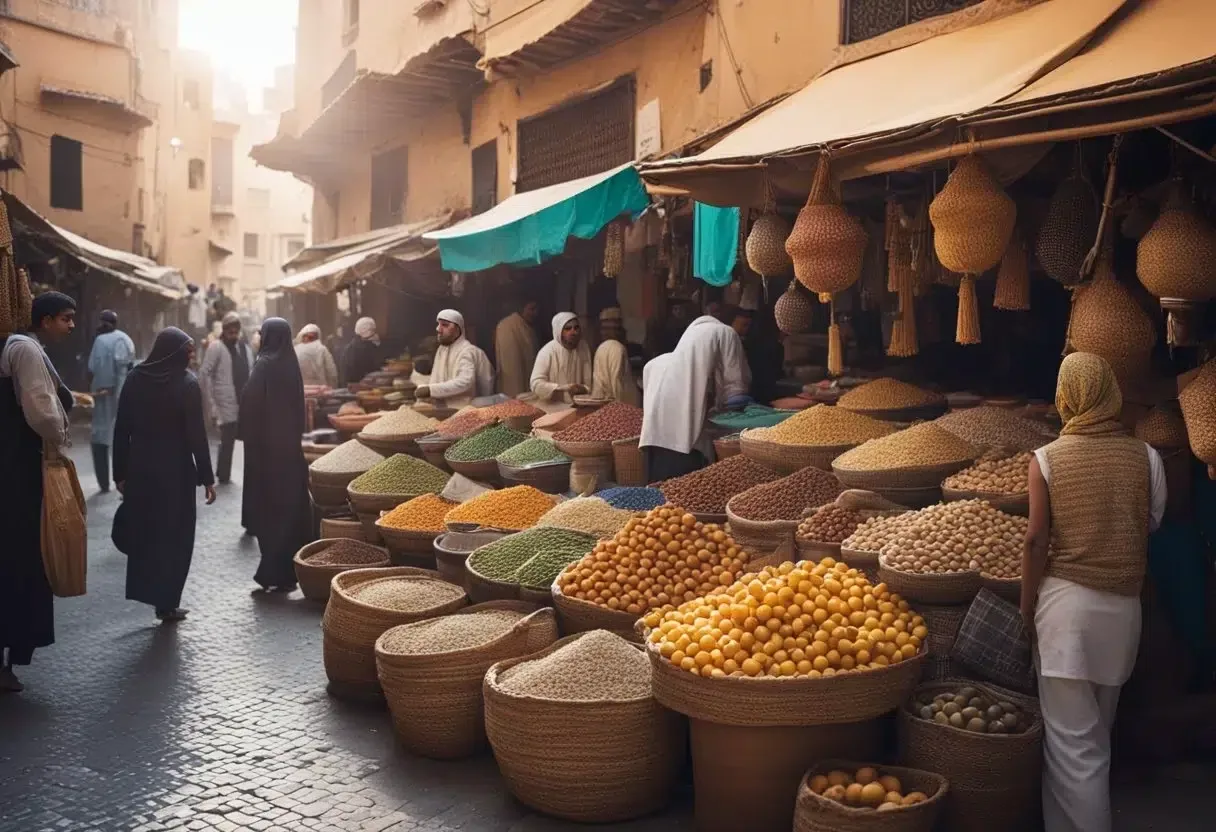
What are effective strategies for learning Moroccan Arabic as a beginner?
Learning Moroccan Arabic as a beginner can be challenging, but several effective strategies can help. Immersing oneself in the language by speaking with locals, attending language exchange events, and watching Moroccan TV shows and movies can be helpful. Additionally, using language learning apps like Duolingo, Rosetta Stone, and Memrise can aid in vocabulary acquisition and basic grammar comprehension. Here is a comprehensive guide to mastering the language.
Can I achieve fluency in Darija through online courses, and which are recommended?
While online courses can be a useful supplement to in-person language learning, achieving fluency in Moroccan Arabic solely through online courses can be challenging. However, several online courses can be helpful, such as the Darija Moroccan Arabic course on Udemy, and the Moroccan Arabic course on Mango Languages. This article provides more information on studying Arabic in Morocco.
How much time is typically required to become fluent in Moroccan Arabic?
The amount of time required to become fluent in Moroccan Arabic can vary depending on several factors, including the learner’s prior language learning experience, their level of dedication, and the amount of time they spend practicing. However, according to the Foreign Service Institute, it can take around 2,200 hours of study to achieve fluency in Arabic. This guide provides tips on how to master the language in Morocco.
What are the best resources or books to aid in learning Moroccan Arabic?
Several resources and books can be helpful in learning Moroccan Arabic, including “Moroccan Arabic: Shnoo the Hell is Going On H’naa?” by Aaron Sakulich, “Moroccan Arabic Phrasebook” by Dan Bacon, and “Moroccan Arabic: A Functional Introduction” by Abdellah Chekayri. Additionally, language learning apps like Lingualism and Glossika can be useful. Here is a guide to learning Arabic in Morocco.
Are there any free tools available for learning Darija effectively?
Yes, there are several free tools available for learning Darija effectively. The website Speak Moroccan offers free lessons and resources for learning the language. Additionally, the YouTube channel Learn Moroccan Arabic with Nora provides free video lessons for beginners. This article offers a comprehensive guide to learning Moroccan Arabic.
What are the major challenges faced by learners of Moroccan Arabic and how can they be overcome?
One of the major challenges faced by learners of Moroccan Arabic is the dialect’s unique pronunciation and vocabulary. Additionally, the use of French and Berber words can make comprehension difficult for non-native speakers. To overcome these challenges, learners should focus on practicing their listening and speaking skills, and seek out opportunities for immersion in the language. Here is a guide to mastering the language in Morocco.
Overall, learning Moroccan Arabic can be a rewarding experience for those willing to put in the time and effort. With the right resources and strategies, learners can achieve fluency in the language and gain a deeper understanding of Moroccan culture and society.




